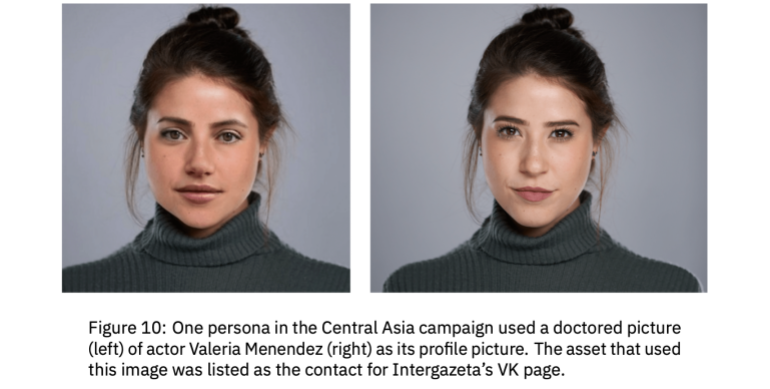Fake accounts promoted pro-Western narratives while trying to discredit China, Russia and Iran, researchers say.

Facebook, Instagram and Twitter disrupted pro-US covert influence operations that used “deceptive tactics” to shape opinion in Central Asia and the Middle East, according to internet researchers
[File: Avishek Das/SOPA Images/LightRocket/Getty Images]
Published On 25 Aug 2022
Facebook, Instagram and Twitter disrupted pro-United States covert influence operations that used “deceptive tactics” to shape opinion in Central Asia and the Middle East, according to a report by internet researchers.
Dozens of fake accounts promoted pro-Western narratives while trying to discredit countries including China, Russia and Iran over a nearly five-year period, according to the report released on Wednesday by Graphika Inc and the Stanford Internet Observatory (SIO).
The most active campaign targeted Russian-speaking internet users in Central Asia, with much of the activity focused on criticising Russia over civilian deaths and other atrocities following its invasion of Ukraine, according to the study.
“These posts primarily focused on US support for central Asian countries and their people, presenting Washington as a reliable economic partner that would curb the region’s dependence on Russia,” the report said.
“Other posts argued that the US was the main guarantor of Central Asia’s sovereignty against Russia, frequently citing the war in Ukraine as evidence of the Kremlin’s ‘imperial’ ambitions.”
The Central Asia campaign, consisting of 12 Twitter accounts, 25 Facebook profiles and pages, and 10 Instagram accounts, also spread negative messaging about China’s treatment of the Uighurs in Xinjiang, where human rights activists say more than one million ethnic minority Muslims have been detained without trial.
“These accounts — a fake persona and sham media outlet — mainly focused on the genocide of Uighurs and Muslim minorities in ‘reeducation’ camps in Xinjiang,” the report said.
“Posts described alleged organ trafficking, forced labour, sexual crimes against Muslim women, and suspicious disappearances of ethnic Muslims in Xinjiang. The assets also posted about the Chinese Communist Party’s poor treatment of women in the country and often framed these stories around news about domestic violence.”
Other networks sought to exert influence in Iran, Afghanistan, Lebanon, Yemen, Syria and Iraq.
Limited reach
In some cases, the accounts shared news articles from Washington-funded media outlets, including Voice of America and Radio Free Europe, and links to websites run by the US military.
Graphika and SIO did not attribute the operations to a specific group or organisation, but Facebook parent company Meta and Twitter said the “presumptive” or known countries of origin for the activity were the US and the United Kingdom.
The tactics outlined in the report resemble many of the same strategies that US officials have accused Russia and China of using to sow divisions and discord in their country.
In the case of one account involved in the Central Asia campaign, a Facebook profile used a doctored photo of the Puerto Rican actress Valeria Menendez.

[Courtesy of Graphika Inc and Stanford Internet Observatory]
Other accounts and pages posed as media outlets, including a sham outlet called Vostochnaya Pravda that claimed to report “absolute facts” about Central Asia.
The propaganda effort came to light after Meta, Facebook’s parent company, and Twitter shared a collection of data with researchers after removing a number of accounts for “platform manipulation” and “inauthentic behaviour”.
The dataset shared with Graphika and SIO spanned 299,566 tweets sent by 146 accounts between March 2012 and February 2022.
The campaigns, however, had a questionable degree of success, according to the report, due to their limited reach.
“Importantly, the data also shows the limitations of using inauthentic tactics to generate engagement and build influence online,” the report said.
“The vast majority of posts and tweets we reviewed received no more than a handful of likes and retweets, and only 19 percent of covert assets we identified had more than 1,000 followers.”
Graphika and SIO said their findings appeared to be the first case of a covert pro-Western influence campaign being identified and disrupted by Twitter and Meta.
In February, Meta announced it had suspended about 40 fake pro-Russian accounts, groups and pages for disseminating propaganda about the war in Ukraine.
Other accounts and pages posed as media outlets, including a sham outlet called Vostochnaya Pravda that claimed to report “absolute facts” about Central Asia.
The propaganda effort came to light after Meta, Facebook’s parent company, and Twitter shared a collection of data with researchers after removing a number of accounts for “platform manipulation” and “inauthentic behaviour”.
The dataset shared with Graphika and SIO spanned 299,566 tweets sent by 146 accounts between March 2012 and February 2022.
The campaigns, however, had a questionable degree of success, according to the report, due to their limited reach.
“Importantly, the data also shows the limitations of using inauthentic tactics to generate engagement and build influence online,” the report said.
“The vast majority of posts and tweets we reviewed received no more than a handful of likes and retweets, and only 19 percent of covert assets we identified had more than 1,000 followers.”
Graphika and SIO said their findings appeared to be the first case of a covert pro-Western influence campaign being identified and disrupted by Twitter and Meta.
In February, Meta announced it had suspended about 40 fake pro-Russian accounts, groups and pages for disseminating propaganda about the war in Ukraine.
SOURCE: AL JAZEERA
No comments:
Post a Comment